I’m in the middle of the New Jersey Association of School Librarians conference. The keynote was this morning, and I was nervous. I’m always nervous. But I was especially nervous this morning, because this seems like an especially bookie conference. The address went well, and people were very thankful and hospitable. One person told me that he overheard another library administrator leave the room after the address saying, “I feel like a cave man!” That’s not my goal, and it disturbs me a bit. The talk was not really about technology, but about this time of rapid change. Perhaps you can be my age, hear about rapid change, and not feel like neanderthal.
Another librarian told me a story, which she gave me permission to report here. She manages a high school library, and has for 39 years. Pause! She told me about a project that she had coordinated with a chemistry teacher, where students were required to produce a multimedia presentation on one of the elements, and that they were to convince the rest of the class that their’s was the greatest element — in some way. She told me about one student who was constantly in the principal’s office, constantly missing class, but that during this project he was never sent to the office and did not miss a single day.
She also told me about another student who was completely deaf. She had a sign interpreter who worded with her each day, and she worked very hard on her product. When the day arrived for the presentations to be delivered to the class, her interpreter was out sick, and a substitute was there. The girl was devastated, because she didn’t feel comfortable with the new person. She went to the librarian, not knowing what to do. She didn’t want to mess it up, but she had worked so hard on the presentation that she didn’t want to not do it. The librarian urged her to do the presentation with the substitute, to go for it.
Instead, the girl presented it herself. She spoke it in language that was barely understandable, but did it. The librarian told me that the class paid attention to that presentation more intensely than any of the others, because many had never heard her speak at all. She said that from that point on, the girl started speaking out in class, when she never did before.
Many people talk about how technology is so much more engaging to kids, that it’s why they work harder on projects such as this. This is true, but I think it’s much more fundamental. I think its about power. The purpose of most classrooms is to disempower students. We sentence them to a desk, to a chapter in a text book, to listen to, note, and remember a lecture, to passively receive, accept, and repeat. When students are given access to information and asked to use it as a raw material, and the technology to work the information, they become information artisans — they become empowered learners.


 This is an interesting announcement that I goot from the TechLearning News update. I do not know much about the MacArthor Foundation, and haven’t given the site a good going over, but the intent seems to indicate an encouraging trend to starting to respect our students adopted realm.
This is an interesting announcement that I goot from the TechLearning News update. I do not know much about the MacArthor Foundation, and haven’t given the site a good going over, but the intent seems to indicate an encouraging trend to starting to respect our students adopted realm. 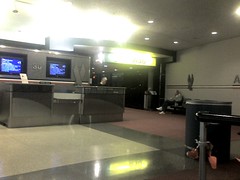
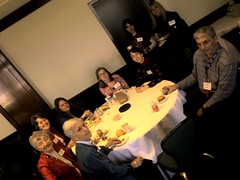
 After working at the
After working at the  I seem to be on a library/media tear right now. Last week I spoke at the
I seem to be on a library/media tear right now. Last week I spoke at the 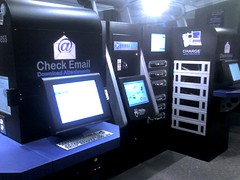
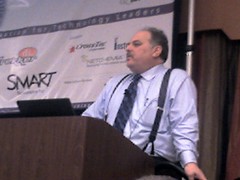 You can still buy mimeograph materials. He found the ordering information. People are still using this stuff. He just showed us a picture of one of the old optic projector, and reminded us of the smell of your book starting to catch on fire. He’s got the crowd going, especially considering his opening. I’ll write about that later!
You can still buy mimeograph materials. He found the ordering information. People are still using this stuff. He just showed us a picture of one of the old optic projector, and reminded us of the smell of your book starting to catch on fire. He’s got the crowd going, especially considering his opening. I’ll write about that later!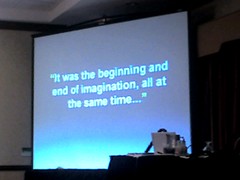 Woe! RateMyTeacher is now RSS syndicated. Interesting in lots of ways. He’s talking about a John Mayer concert that he attended with his sister. All of the kids had their cell phones out, where text messaging and calling each other from different points in the concert hall, and people out side. Conversations, conversation, conversations, on many levels.
Woe! RateMyTeacher is now RSS syndicated. Interesting in lots of ways. He’s talking about a John Mayer concert that he attended with his sister. All of the kids had their cell phones out, where text messaging and calling each other from different points in the concert hall, and people out side. Conversations, conversation, conversations, on many levels.